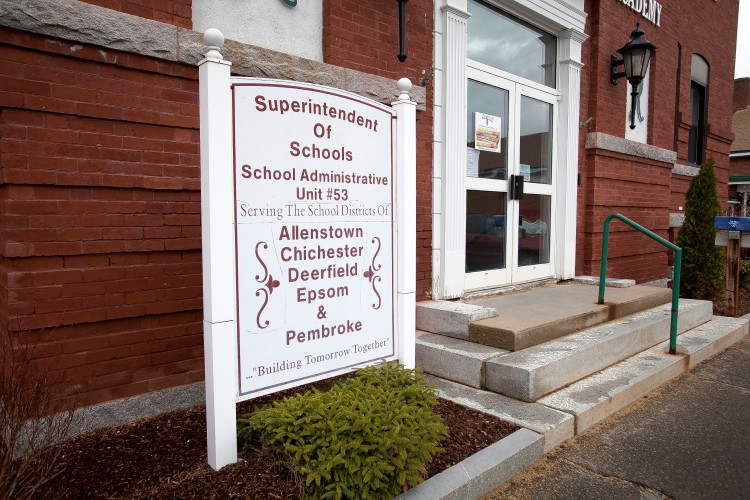Opinion: Joining together may be the answer for poorly funded schools

A sign marks the New Hampshire School Administrative Unit #53 offices in Pembroke on April, 2, 2016. (ELIZABETH FRANTZ / Monitor staff) Elizabeth Frantz
| Published: 04-30-2025 11:48 AM |
Susan Seidner lives in Pembroke.
As a former special education teacher, I read Mr. Louis Esposito’s My Turn titled “Inclusion is Important” with interest. The majority of what he wrote was correct and heartfelt, but I would like to make two comments.
I, too, have written letters about New Hampshire’s unwillingness to fund public education — any public education — but at this point, I realize the articles, the lawsuits we have won, the protests and the letters we’ve directed to our Republican representatives and Republican governors have little to no effect. We will not be getting help from these leaders.
My father was an educator who left New Hampshire in 1960 due to the state’s poor funding of education. That was 65 years ago, and I would say the situation is worse today. Public education is now perceived as the enemy.
For that reason, I was thrilled when our assistant superintendent said in a meeting that towns were looking at options to educate our most expensive students closer to home in some type of collaborative program. These are not typical students served by special educators. These are students with severe problems who often disrupt other students’ learning and may make the school dangerous for themselves or others.
They are children who find a typical school setting too challenging due to a diagnosed disability. They may also be students whose disabilities are such that they are not getting the instruction or attention they need to help them learn and grow. Schools in New Hampshire cannot afford to have social workers and mental health staff in their school buildings. And is it really the role of schools to deal with extreme problems when they have so few resources or when the resources they do have are no longer affordable?
With the cuts in mental health services and developmental services, where will we now refer them?
Article continues after...
Yesterday's Most Read Articles
 Bill to allow ‘no fault’ evictions makes it to governor’s desk
Bill to allow ‘no fault’ evictions makes it to governor’s desk
 ‘He’s coming home’: Jury acquits former prison guard Matthew Millar in murder trial
‘He’s coming home’: Jury acquits former prison guard Matthew Millar in murder trial
 Look, up in the sky! It’s… an Airstream trailer?
Look, up in the sky! It’s… an Airstream trailer?
 Around Concord: Living in an 1856 schoolhouse is (mostly) delightful
Around Concord: Living in an 1856 schoolhouse is (mostly) delightful
 Slots and no bet limits: State budget shakes up New Hampshire’s casino landscape
Slots and no bet limits: State budget shakes up New Hampshire’s casino landscape
 ‘Deep flavor’ – New restaurant in downtown Concord offers creative spin on comfort food and cocktails
‘Deep flavor’ – New restaurant in downtown Concord offers creative spin on comfort food and cocktails
Out-of-district placements for students easily run $175,000, maybe more, depending on transportation. This is just not sustainable. We need to develop other solutions, and joining together may be the answer.
Do not wait for help from the state. It is sad to say, but for the majority of us, our everyday needs are just not a priority for those in control.







 Opinion: What Coolidge’s century-old decision can teach us today
Opinion: What Coolidge’s century-old decision can teach us today Opinion: The art of diplomacy
Opinion: The art of diplomacy Opinion: After Roe: Three years of resistance, care and community
Opinion: After Roe: Three years of resistance, care and community Opinion: Iran and Gaza: A U.S. foreign policy of barbarism
Opinion: Iran and Gaza: A U.S. foreign policy of barbarism
